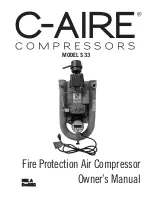
6
( )
Book 54722160 (8/02)
SECTION 1-- SAFETY
SAFETY PRECAUTIONS
General Information
Ensure that the operator reads and understands the
decals and consults the manuals before maintenance
or operation.
Ensure that the Operation and Maintenance manual,
and the manual holder if equipped, are not removed
permanently from the machine.
Ensure that maintenance personnel are adequately
trained, competent and have read the manuals.
Make sure that all protective covers are in place and
that the canopy/doors are closed during operation.
The specification of this machine is such that the ma-
chine is not suitable for use in flammable gas risk
areas. If such an application is required then all local
regulations, codes of practice and site rules must be
observed. To ensure that the machine can operate in
a safe and reliable manner, additional equipment such
as gas detection, exhaust spark arrestors, and intake
(shut--off) valves may be required, dependent on local
regulations or the degree of risk involved.
Air discharged from this machine may contain carbon
monoxide or other contaminants which will cause seri-
ous injury or death. Do not breathe this air.
Compressed air can be dangerous if incorrectly han-
dled. Before doing any work on the unit, ensure that all
pressure is vented from the system and that the ma-
chine cannot be started accidentally.
Ensure that the machine is operating at the rated pres-
sure and that the rated pressure is known to all rele-
vant personnel.
All air pressure equipment installed in or connected to
the machine must have safe working pressure ratings
of at least the machine safety valve rating.
If more than one compressor is connected to one com-
mon downstream plant, effective check valves and
isolation valves must be fitted and controlled by work
procedures, so that one machine cannot accidentally
be pressurized or over pressurized by another.
Compressed air must not be used for a feed to any
form of breathing apparatus or mask.
The discharged air contains a very small percentage
of compressor lubricating oil and care should be taken
to ensure that downstream equipment is compatible.
If the discharged air is to be ultimately released into a
confined space, adequate ventilation must be pro-
vided.
When using compressed air, always use appropriate
personal protective equipment.
All pressure containing parts, especially flexible hoses
and their couplings, must be regularly inspected, be
free from defects and be replaced according to the
Manual instructions.
Avoid bodily contact with compressed air.
Never operate unit without first observing all safety
warnings and carefully reading the operation and
maintenance manual shipped from the factory with
this machine.
Never operate the engine of this machine inside a
building without adequate ventilation. Avoid breathing
exhaust fumes when working on or near the machine.
Do not alter or modify this machine.
A battery contains sulfuric acid and can give off gases
which are corrosive and potentially explosive. Avoid
contact with skin, eyes and clothing. In case of contact,
flush area immediately with water.
Exercise extreme caution when using booster battery.
To jump battery, connect ends of one booster cable to
the positive (+) terminal of each battery. Connect one
end of other cable to the negative (--) terminal of the
booster battery and other end to a ground connection
away from dead battery (to avoid a spark occurring
near any explosive gases that may be present). After
starting unit, always disconnect cables in reverse or-
der.
Never operate unit without first observing all safety
warnings and carefully reading the operation and
maintenance manual shipped from the factory with
this machine.







































